|
|
|
Sort Order |
|
|
|
Items / Page
|
|
|
|
|
|
|
| Srl | Item |
| 1 |
ID:
128973
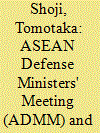

|
|
|
|
|
| Publication |
2013.
|
| Summary/Abstract |
This paper explores the ASEAN Defense Ministers' Meeting (ADMM) and the ADMM Plus, focusing
on ASEAN's purpose to launch a meeting of defense ministers in terms of community building, the
evolution of the ADMM with the ensuing establishment of its enlarged version - the ADMM Plus, and
the significance of the ADMM Plus from a comparative perspective. A brief analysis of the approach
taken by Japan toward this multilateral framework, as a long-time dialogue partner of ASEAN, is
added to the conclusion. Generally, the ADMM and the ADMM Plus processes have so far developed
steadily, materializing in an incremental way the original visions to promote institutionalization
and practical cooperation. It is highly likely that the ADMM Plus will regularize the annual joint
exercises in nontraditional security based on the system of rotational Expert Working Groups
(EWGs). Activities in the ADMM (Plus) imply ASEAN's strong will to differentiate the framework
from the ASEAN Regional Forum (ARF), which countries concerned have found to be ineffective
for promoting conflict prevention and dealing with confrontational, sensitive issues of traditional
security, like the South China Sea. Today, the participants in the ADMM Plus including Japan seem
to fully recognize the utility of the platform. This is not only in terms of having a regular meeting
venue of relevant defense ministers, but also fostering deeper cooperation of defense and security by
conducting meetings at various levels of defense officials and joint exercises in nontraditional security
areas. However, the participants in the multilateral framework are going to see some future challenges
for the relevance of the mechanism, including territorial and maritime disputes.
|
|
|
|
|
|
|
|
|
|
|
|
|
|
|
|
| 2 |
ID:
114645
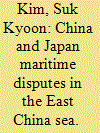

|
|
|
|
|
| Publication |
2012.
|
| Summary/Abstract |
This article examines recent developments in the East China Sea maritime disputes, focusing primarily on the Principled Consensus agreed on by China and Japan for the joint development of energy resources. The article also provides a perspective on the East China Sea maritime disputes between the two countries within the context of international relations.
|
|
|
|
|
|
|
|
|
|
|
|
|
|
|
|
| 3 |
ID:
130626
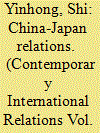

|
|
|
| 4 |
ID:
157807


|
|
|
|
|
| Summary/Abstract |
In a departure from its previous stance, China, in August 2017 during the Association of Southeast Asian Nations (ASEAN) Foreign Ministers' meeting, stated that it Beijing was willing to discuss the possibility of re-engaging in a dialogue on the Code of Conduct (CoC) in the South China Sea. The CoC is not a new idea in the region in terms of finding an amicable solution to the South China Sea dispute, which involves China, Taiwan, Vietnam, Brunei, Malaysia, and the Philippines. In 2002, China and the ASEAN member countries officially engaged in formalising the CoC for the first time. However, the CoC finally agreed to was non-binding in nature. While the decision recently taken by the ASEAN countries and China in restarting the negotiations to discuss the CoC again has been seen as a positive move, it is widely believed that, keeping in view China's assertive posture, it is not likely to agree to the CoC anytime soon.
This paper discusses the origin and evolution of the CoC in the South China Sea, provides an analysis of China's behaviour with regard to the CoC, and concludes by listing the future prospects for the CoC in the South China Sea.
|
|
|
|
|
|
|
|
|
|
|
|
|
|
|
|
| 5 |
ID:
163089
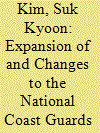

|
|
|
|
|
| Summary/Abstract |
East Asian countries have vigorously engaged in a buildup of the capabilities of their coast guards. This has been driven in part by the need to protect their maritime jurisdiction in the face of numerous maritime disputes. The coast guards in East Asia serve as the front-line defender of sovereignty and maritime claims.
|
|
|
|
|
|
|
|
|
|
|
|
|
|
|
|
| 6 |
ID:
133062
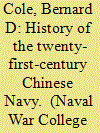

|
|
|
|
|
| Publication |
2014.
|
| Summary/Abstract |
China historically has been a continental rather than a maritime power, despite its more than eleven thousand miles of coastline and more than six thousand islands. It has more often viewed the sea as a potential invasion route for foreign aggressors rather than as a medium for achieving national goals, a tendency that has contributed to the weakness of the Chinese maritime tradition. This attitude had changed by the beginning of the twenty-first century. The remarkable growth of China's economy beginning in the last two decades of the twentieth century, the broadening of Beijing's global political and economic interests, and resolution of almost all border disputes with its many contiguous neighbors have contributed to increased attention to threats to the vital sea lines of communication (SLO Cs) on which China increasingly depends.
|
|
|
|
|
|
|
|
|
|
|
|
|
|
|
|
| 7 |
ID:
097646
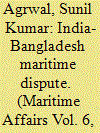

|
|
|
| 8 |
ID:
131194
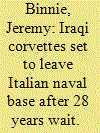

|
|
|
|
|
| Publication |
2014.
|
| Summary/Abstract |
Italian shipbuilder Fincantieri and the Iraqi government have signed an agreement that resolves a long running dispute over two corvettes that Baghdad ordered in 1980.
|
|
|
|
|
|
|
|
|
|
|
|
|
|
|
|
| 9 |
ID:
133154
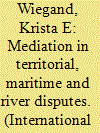

|
|
|
|
|
| Publication |
2014.
|
| Summary/Abstract |
This article seeks to explain factors that make mediation attempts more or less likely in territorial, maritime, and river disputes. I argue that the intensity of the dispute and the salience of disputed territory have strong influence on mediation attempts. The study further examines the impact of these factors on the type of mediation strategy (directive, procedural, or communications). Hypotheses about mediation attempts are tested with the icow data set of interstate territorial, maritime, and river disputes from 1816 to 2001. Findings indicate that intensity of the dispute and salience of disputed territory have a strong impact on the selection of mediation in the first place, and second, that salience of disputed territory makes the directive strategy more likely, while intensity of the dispute makes procedural or communications strategies more likely.
|
|
|
|
|
|
|
|
|
|
|
|
|
|
|
|
| 10 |
ID:
126686
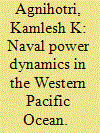

|
|
|
|
|
| Publication |
2013.
|
| Summary/Abstract |
The Western Pacific Region is currently faced with a number of territorial sovereignty disputes and contestations over claimed associated maritime zones. The locus of such disputes lies mainly around the Senkaku/Diaoyu islands in East China Sea; and the Paracel and Spratly chain of islands in the South China Sea. All the disputants are notably engaged in modernising their defense forces, with particular emphasis on naval modernisation. While the pace and quantum of such navy-building is dependent on the individual countries' comprehensive national power (CNP), China and Japan are the leading protagonists. When viewed in the context of long-standing and intractable maritime disputes, the increasing naval capabilities of regional countries adds to the level of their confrontationist postures. This may at times, lead to undesirable outcomes by way of sheer miscalculation. In such an environment, The US decision to 'pivot' to this region brings in huge foreign policy challenges, which it must overcome in order to ensure lasting peace and stability therein.
|
|
|
|
|
|
|
|
|
|
|
|
|
|
|
|
| 11 |
ID:
076609
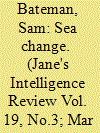

|
|
|
| 12 |
ID:
124739
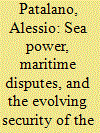

|
|
|
|
|
| Publication |
2013.
|
| Summary/Abstract |
The sea sets East Asia apart from other regional systems that influence international economic, political and military affairs. Alessio Patalano argues that in East Asia, the centrality of the maritime realm to economic and political matters is transforming it into a primary battleground for national ambitions. Meanwhile, the wide range of functions exercised by maritime forces puts them at the forefront of both competition and the management of security issues and regional stability. Maritime security issues are therefore likely to remain high on the regional agenda in East Asia, although the risk of escalation to war may not be as high as is often assumed.
|
|
|
|
|
|
|
|
|
|
|
|
|
|
|
|
| 13 |
ID:
133176
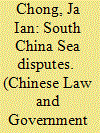

|
|
|
|
|
| Publication |
2014.
|
| Summary/Abstract |
An introduction is presented in which the editor discusses various reports within the issue on various topics related to the dispute over the South China Sea including the causes, the relationship between China and the Philippines, and the role of nonclaimants in the disputes.
|
|
|
|
|
|
|
|
|
|
|
|
|
|
|
|
| 14 |
ID:
128286
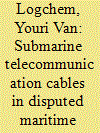

|
|
|
|
|
| Publication |
2014.
|
| Summary/Abstract |
There are a considerable number of maritime areas where no boundary exists, or where a boundary is delimited only in part. This article deals with the issue of submarine telecommunication cables, which are sometimes placed on the seabed or buried in the subsoil of areas that are claimed by multiple states, and identifies specific issues that arise in the context of areas of overlapping claims.
|
|
|
|
|
|
|
|
|
|
|
|
|
|
|
|
| 15 |
ID:
167519
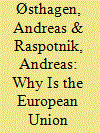

|
|
|
|
|
| Summary/Abstract |
Why is the European Union (EU) pursuing a relatively minor issue over the right to catch snow crab in the Barents Sea? The issue has highlighted an underlying disagreement between Norway and the EU over the status of the maritime zones around the archipelago of Svalbard, stemming from the 1920 Spitsbergen Treaty. Is the EU using the snow crab to challenge Norway’s Svalbard regime? The answer is that the EU is a multifaceted animal, where special interests can hijack the machinery and bring issues to the table, given the right circumstances. This article outlines these circumstances, as well as the evolution and the sources of the dispute over the snow crab, as it relates to not only economic interests, but international politics as well as law.
|
|
|
|
|
|
|
|
|
|
|
|
|
|
|
|
|
|
|
|
|